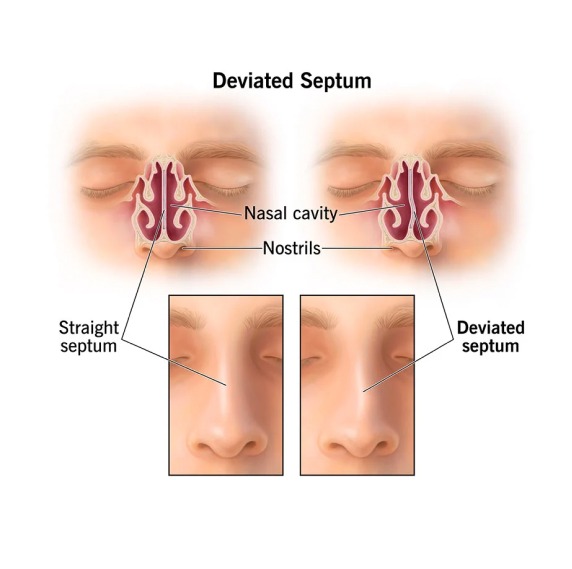Definition
Nasal blockage, also known as nasal congestion or a stuffy nose, refers to the obstruction or narrowing of the nasal passages, leading to difficulty in breathing through the nose. It is a common condition that can be caused by various factors.

Causes of Nasal Blockage
Nasal blockage can result from multiple causes, including:
Viral Infections: The common cold or influenza can lead to nasal congestion due to inflammation of the nasal tissues.
Allergies: Allergic reactions to pollen, dust, pet dander, or certain foods can cause swelling and congestion in the nasal passages.
Sinusitis: Inflammation or infection of the sinuses can lead to nasal blockage.
Deviated Septum: A deviated nasal septum, a structural abnormality, can obstruct airflow.
Nasal Polyps: Benign growths in the nasal passages can block airflow.
Environmental Irritants: Exposure to irritants such as tobacco smoke or pollutants can cause congestion.
Pregnancy: Hormonal changes during pregnancy can lead to nasal congestion.
Symptoms of Nasal Blockage
Nasal blockage is often accompanied by the following nasal blockage symptoms:
Difficulty Breathing: Breathing through the nose becomes challenging.
Runny or Stuffy Nose: Excessive mucus production or nasal discharge.
Sneezing: Frequent sneezing may accompany congestion, especially in allergic reactions.
Postnasal Drip: Mucus draining from the back of the throat.
Reduced Sense of Smell: Diminished ability to smell odors.
Pressure or Pain: Discomfort around the sinuses or face in cases of sinusitis.
Snoring: Nasal congestion can contribute to snoring during sleep.

Treatment of Nasal Blockage
The nasal blockage treatment depends on its underlying cause and severity. Options may include:
Over-the-Counter Decongestants: Nasal decongestant sprays or oral medications can provide temporary relief by reducing swelling.
Antihistamines: If allergies are the cause, antihistamines can help alleviate symptoms.
Nasal Irrigation: Using saline nasal sprays or saline douches can help clear mucus and reduce congestion.
Prescription Medications: In cases of chronic congestion or sinusitis, antibiotics or corticosteroids can help.
Surgery: Surgical interventions, such as septoplasty or sinus surgery, may be necessary for structural issues or severe cases.
Management and Prevention
To manage and prevent nasal blockage:
Hydration: Drink plenty of fluids to keep nasal secretions thin.
Humidifiers: Use a humidifier to add moisture to the air, especially during dry seasons.
Allergen Avoidance: Identify and avoid allergens that trigger congestion.
Hand Hygiene: Frequent hand washing can reduce the risk of viral infections.
Smoking Cessation: Quitting smoking and avoiding secondhand smoke can improve nasal health.
Regular Check-Ups: Visit a healthcare provider for underlying conditions or allergies.
Summary
Nasal blockage, or nasal congestion, is the narrowing or obstruction of the nasal passages, making it difficult to breathe through the nose. It can result from various causes, including infections, allergies, structural issues, and irritants. Common symptoms include difficulty breathing, runny or stuffy nose, and reduced sense of smell. Treatment options depend on the cause and may include medications, nasal irrigation, or surgery. Managing and preventing nasal blockage involves staying hydrated, using humidifiers, avoiding allergens, and seeking medical advice for chronic or severe cases. If you experience persistent nasal blockage, consult a healthcare professional for an accurate diagnosis and appropriate treatment.


